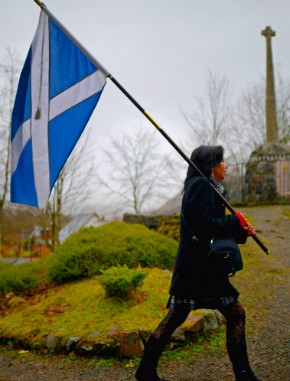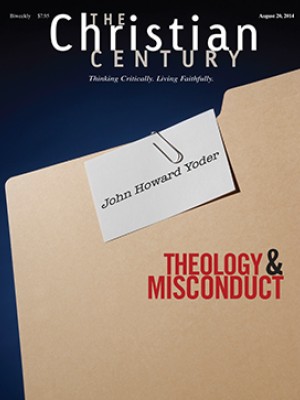Referendum

After seven years living in North Carolina I made my stand about the Civil War: the South was wrong about the slaves but may have been onto something about the politics.
What I meant was that many of the fights about politics in the United States today come from the country simply being too big to be manageable. The language about Washington, D.C., being “broken” and needing to be “fixed” seems to me to come from the wrong semantic field; we’re not talking about a plumbing issue—it’s more like obesity. The vital organs of the capital are under major pressure servicing a body that’s just too large. I thought North Carolina was a nice size for a country. It had mountains and coastline, rural areas and cities, and a diverse population of a tidy 10 million. That was plenty.
So it’s with mixed feelings that I face what may be the most significant day of self-understanding for the people of the United Kingdom in my lifetime—the September 18 referendum on whether Scotland should be an independent country. In principle I’m all for devolved authority and the flourishing of free peoples; yet surely nationalism got a good airing in the 20th century and showed us beyond reasonable doubt that it’s a dangerous, inhospitable, and ugly thing. Either way, the United Kingdom is poised to decide on what’s been dubbed the greatest act of self-mutilation in its history. Just imagine a Union Jack flag with the white St. Andrew’s cross removed from it. And the English, for the most part, whether modest or dumbfounded, are saying nothing about it.
Read our latest issue or browse back issues.
For anyone studying or teaching ethics at a university or seminary, the debate about Scottish independence fits neatly into the categories that the discipline likes to produce. There are two conventional kinds of ethics. One looks for iron rules about right and wrong that are written into the DNA of creation, like the Ten Commandments. The other, which has fewer pretensions, is to do whatever turns out for the best.
What’s happened in Western society in the last hundred years is that the second answer has replaced the first as the default setting for public morality. When politicians talk about right and wrong, the public says, “Who do you think you are?” But when they talk about what will work and turn out for the best, the public thinks they’re doing their job. When Christian leaders speak about morality, people expect them to uphold a somewhat old-fashioned version of the first answer.
In the case of Scottish independence, diehard nationalists believe that every race and nation should have its own country. This has a force of rightness about it that goes way beyond circumstantial detail. That’s the gut instinct that’s driving the whole conversation. But it turns out the political debate isn’t about that—it revolves around the second area, with calculations of whether the economy would be in better shape with a Yes vote, how long the North Sea oil and gas reserves will last, and what the unforeseen consequences of independence might be.
Every now and then a celebrity says, “We’re having the wrong kind of debate. We should be asking, ‘Is this really who you want to be?’ Isn’t life really about enjoying diversity, rather than about breaking off into smaller, more monochrome groups?” The celebrities are right. They’re talking about a third kind of ethics, which is less about doing the right thing and more about being the right person. The third answer is to strive for honor and dignity, for love and beauty, for truth and wisdom, for courage and patience, and to work to make people and communities of trust and faith and understanding and justice.
This is where the No campaign has dropped the ball. The issues aren’t fundamentally about childcare and currency or universities and defense; they aren’t even about whether there’s something fundamental in the English psyche that can’t see Scotland and will continue to use the terms English and British interchangeably. The issue for the No campaign is this: Why can no one cast a vision of a dynamic, vibrant, joyful multicultural British society that the Scots would be fools to leave?
What the debate has exposed is a vacuum in British society as a whole. Not only is no one able to offer an aspirational picture of a whole society where there’s a place for everybody and the various identities enrich and bring out the best in one another; beyond that, our public discourse no longer even permits such language or such a vision. In the absence of an inspiring large canvas, it’s inevitable that minority rhetoric will sound more compelling and exciting. But that can only mean splitting into smaller and smaller groups.
The third kind of ethics described above has a reputation, in Christian circles, for being concerned only for the formation of character within the church. But it’s often forgotten that that formation of character has a final goal beyond itself: the church’s role in God’s inauguration of the kingdom. It’s time the church rediscovered how to articulate a compelling social vision, because one thing’s for sure—no one else is doing it.







